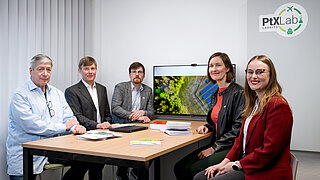How PtX Lab Lausitz wants to transform aviation and maritime transport and the chemical industry
Copyright: iStock / onurdongel
PtX Lab Lausitz is using the action week as an opportunity to highlight the importance of the ‘green molecule’ in the chemical industry, in maritime transport and aviation.
Hydrogen and its derivatives (ammonia, jet fuel, methanol and other fuels and raw materials) will play a central role in a sustainable energy future. Fossil fuels can be replaced, carbon dioxide emissions reduced and industrial processes transformed. Green hydrogen, produced by electrolysis using renewable electrical energy, will be a key element of the energy transition.
It will become a building block for sector coupling and will be particularly important in areas where full electrification would not be feasible or economical in the medium term – especially in the difficult-to-decarbonise sectors of air and maritime transport and parts of industry.
Hydrogen Week will take place from 21 to 29 June 2025 and will highlight the potential applications of hydrogen in the areas of mobility, generation, storage and infrastructure. The PtX Lab Lausitz will demonstrate what is needed to specifically support the environmentally friendly and sustainable market ramp-up of power-to-X (PtX) technologies in these sectors.

Copyright: iStock/Petmal
Rising hydrogen demand and growing challenges
It can be assumed that hydrogen demand will rise sharply in the future. According to the ‘Import Strategy for Hydrogen and Hydrogen Derivatives’ adopted by the German government in 2024, Germany alone will need up to 130 terawatt hours of green hydrogen in the next five years.
As production capacities are currently low and production will not be limited to Germany and Europe, strong market growth and the development of global trade routes are necessary.

Copyright: PtX Lab Lausitz / Steffen Rasche
The use of green hydrogen and its derivatives offers opportunities for development and energy policy. Europe's energy supply can become more resilient.
Concrete steps towards a climate-neutral future
The PtX Lab Lausitz recommends the following concrete steps for the transformation of aviation, maritime transport and the chemical industry:
- Promote the sustainable and rapid market ramp-up of hydrogen derivatives
The development of key economic sectors focused on PtX technologies strengthens independence from fossil fuel imports, promotes both national and international value creation, and prevents long-term lock-in effects. It lays the foundation for resilient, diversified, and geopolitically less vulnerable supply chains, a crucial factor for a future-proof and competitive economy.
When ramping up hydrogen, the focus should clearly be on fossil-free, electricity-based and climate-friendly derivatives. Both national and international production capacities are needed to meet growing demand. Germany plans to expand energy partnerships and import infrastructure in a targeted manner to this end. In order to ensure international acceptance in this context, environmental and social standards must be binding in the producing countries (see PtX Lab Briefing ‘Green Hydrogen Derivatives’).
The market ramp-up should be linked to binding sustainability criteria and accompanied by a transparent, reliable certification system. As a transitional measure, low-carbon, electricity-based derivatives (low-carbon fuels) can be used, provided they achieve significant greenhouse gas reductions of at least 70 per cent compared to fossil alternatives. A successful, cross-sector transformation that contributes to the future viability and resilience of Germany as an industrial location requires a sustainable market ramp-up of PtX technologies. - Strengthen the market ramp-up of PtX chemicals and establish carbon as a valuable resource
We recommend a total of eight guiding principles for the transformation of the chemical industry (see PtX Lab Study ‘Fossil-free chemistry of tomorrow’). They show how instruments for a sustainable ramp-up of PtX chemicals should be designed. Key strategies for reducing chemical demand include improved material efficiency, longer product lifetimes, the avoidance of food waste and a stronger circular economy.
The switch to renewable raw materials such as recycled materials, biomass and PtX also contributes to the defossilisation of the chemical industry. In addition, fossil-free chemistry requires sustainable carbon for material use, which cannot be covered by biomass alone in the long term. PtX chemicals are the key technology for closing this carbon demand gap. Their market ramp-up should be actively promoted and shaped by policy. This requires framework conditions that enable a functioning market for fossil-free carbon and stimulate supply and demand.
Such a carbon economy promotes innovative processes such as carbon capture and utilisation (CCU), closes the carbon demand gap and opens up new value creation potential for a climate-neutral chemical industry. - Strengthening eSAF as a promising technology for Germany as an aviation location
Germany is currently leading the way in announcing projects for the production of electricity-based sustainable aviation fuels (eSAF). This pioneering role should be secured through targeted promotion and the long-term establishment of eSAF capacities.
Biogenic SAF also faces the long-term challenge of limited global availability of biomass. In the long term, eSAF is the only sustainable alternative for achieving greenhouse gas neutrality by 2045. At the same time, its production strengthens Germany's position as a future-proof aviation location (see PtX Lab Briefing ‘Fit for Zero’). - Strategically anchoring sustainable maritime transformation in Germany and Europe
We welcome the new European maritime efforts that include national approaches to securing technological expertise and ramping up alternative fuels. These include the further development of new engine technologies and support for German shipyards to enter the production of offshore converter platforms through guarantees. The provisional decisions taken by the International Maritime Organisation (IMO) in April 2025 mark a milestone in the climate strategy of international shipping.
However, the planned package of measures is unlikely to be sufficient to actually achieve the climate targets. Indirect land use changes caused by certain biofuels and a lack of quantification in the LCA guidelines mean that upstream emissions are not adequately taken into account. This systematic underestimation of actual well-to-wake emissions could lead to a distortion in favour of biofuels.
If the specified emission reduction targets are met purely mathematically through the use of cheaper biofuels, the urgently needed market ramp-up of truly climate-neutral, electricity-based fuels risks being slowed down due to a lack of demand and technical development. Such a development would not only jeopardise the decarbonisation of maritime transport in the long term, but also the ramp-up of a PtX economy with knock-on effects for other sectors.
Contact
Dr
Harry Lehmann
Head of PtX Lab Lausitz
+49 151 40 171 692
Write E-Mail
more information
Contact
Dr
Sarah Bernhardt
Head of Section PtX Basic Materials
+49 173 56 150 72
Write E-Mail
more information

